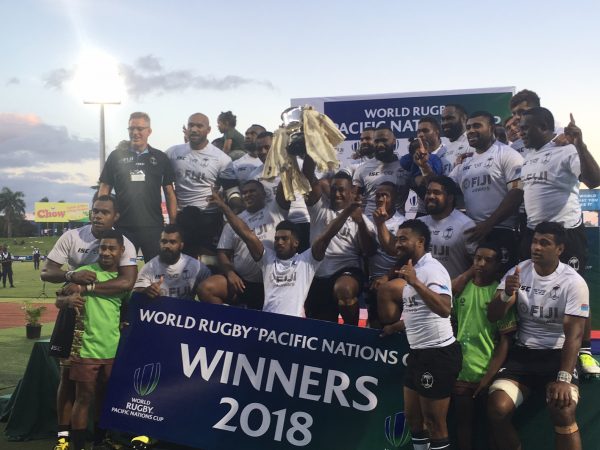We reflect on the 2018 Pacific Nations Cup, which involved Fiji, Samoa, Tonga and Georgia
Fiji show progress with Pacific Nations Cup triumph
It was billed as a clash of styles: Fijian flair versus Georgian grunt, dangerous backs against hard-nosed forwards. Yet the final game of the 2018 Pacific Nations Cup between Fiji and Georgia at ANZ Stadium in Suva saw both sides attempt to match their opponent’s strength – and the hosts’ set-piece held up better than the Georgians’ running game.
Georgia had led 15-10 at half-time but Fiji scored four second-half tries, to add to the two Henry Seniloli got in the opening 40, to wrap up an impressive 37-15 victory and their fourth consecutive Pacific Nations Cup title.
With Semi Radradra scything through the Georgian defence to set up Seniloli’s second try and Georgia barrelling over for their opening five-pointer from a powerful driving lineout in the first half-hour, it looked like the game would play out as expected.
He starred for @Barbarian_FC, Fiji's sevens outfit and was key in his side's World Rugby Pacific Nations Cup win, setting up this try for Henry Seniloli.
It's Semi Radradra! pic.twitter.com/KO4W52dfdl
— World Rugby (@WorldRugby) June 16, 2018
However, Fiji began to negate Georgia’s dominance at the set-piece, holding their own in the scrum and repelling the visitors’ rolling mauls. Georgia, in the second half in particular, also began to move away from their normal game plan and looked to play more expansively, running ball from deep and throwing the odd offload – but they weren’t as effective and their mistakes allowed Fiji to pounce.
“We were pretty pleased with the first half,” said Georgia coach Milton Haig. “We had the possession and territory. But it was totally different in the second half.
“Running out of our own half is not what we do and when the game loosens up, it plays into Fiji’s hands. It’s not our game and if you drop the ball, they pick it up. There are a lot of lessons to learn and it goes back to being disciplined in our game plan for the whole game, not just 40 minutes.”

On the run: Merab Kvirikashvili launches an attack for Georgia against Fiji (World Rugby)
Haig also noted how much the Fiji scrum had improved since June 2016, when Georgia won in Suva, and the set-piece performance was clearly a boon for John McKee.
“We didn’t start off as well as we’d have liked in the set-piece, but we really stuck to our processes and as the game went on I think we took away their advantage,” said the Fiji coach. “Against Georgia, that’s a great effort from us.”
These two teams will meet in the 2019 World Cup and, with Australia, Wales and Uruguay completing the pool, the scrum is sure to play an important role in determining who reaches the quarter-finals.
Related: Fly Fiji Airways to see the home of the world’s great rugby players
If Fiji continue to progress in the set-piece, they are likely to challenge perceived favourites Wales and the Wallabies because they have one of the best back-lines in world rugby. Get the platform up front in Japan next year and they will be able to unleash it – and that’s a scary thought for their opponents.
Take Radradra. This was his first Test appearance for Fiji and, unsurprisingly given his form for Toulon this season, he excelled, capping his performance with a try. He adds another dimension to a strike force that already includes the likes of Nemani Nadolo and Vereniki Goneva.

Lynchpin: Sonatane Takulua makes a break for Tonga in their win over Samoa (World Rugby)
In the earlier game, Tonga saw off Samoa far more comfortably than the 28-18 scoreline would suggest. The Tongans overpowered their island rivals up front, scored three tries in all and Sonatane Takulua was in fine goalkicking form.
Samoa lacked cohesion at times while discipline was an issue for both sides and one they will be looking to tighten up in their next Tests.
Tonga play Fiji in Lautoka on Saturday while Samoa play the first game of their two-legged World Cup qualifier against Germany in Apia on 30 June. Georgia, meanwhile, play Japan this weekend in a fixture they hope will help prepare them for the World Cup.
These teams still have plenty to play for this summer.
Follow Rugby World on Facebook, Twitter and Instagram.





